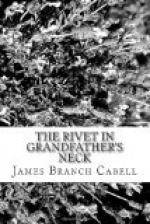He would convey no note to Roger Stapylton. Let the banker announce the engagement. Let the young fellow go to the devil. Colonel Musgrave would marry the girl and make Patricia, at worst, content. To do otherwise, even to hesitate, would be the emptiest quixotism....
Then came the fatal thought, “But what a gesture!” To fling away his happiness—yes, even his worldly fortune,—and to do it smilingly! Patricia must, perforce, admire him all her life.
Then as old Stapylton stirred in his chair and broke into a wide premonitory smile, Colonel Musgrave rose to his feet. And of that company Clarice Pendomer at least thought of how like he was to the boy who had fought the famous duel with George Pendomer some fifteen years ago.
Ensued a felicitous speech. Rudolph Musgrave was familiar with his audience. And therefore:
Colonel Musgrave alluded briefly to the pleasure he took in addressing such a gathering. He believed no other State in the ’Union could have afforded an assembly of more distinguished men and fairer women. But the fact was not unnatural; they might recall the venerable saying that blood will tell? Well, it was their peculiar privilege to represent to-day that sturdy stock which, when this great republic was in the pangs of birth, had with sword and pen and oratory discomfited the hirelings of England and given to history the undying names of several Revolutionary patriots,—all of whom he enumerated with the customary pause after each cognomen to allow for the customary applause.
And theirs, too, was the blood of those heroic men who fought more recently beneath the stars and bars, as bravely, he would make bold to say, as Leonidas at Thermopylae, in defense of their loved Southland. Right, he conceded, had not triumphed here. For hordes of brutal soldiery had invaded the fertile soil, the tempest of war had swept the land and left it desolate. The South lay battered and bruised, and pros trate in blood, the “Niobe of nations,” as sad a victim of ingratitude as King Lear.
The colonel touched upon the time when buzzards, in the guise of carpet-baggers, had battened upon the recumbent form; and spoke slightingly of divers persons of antiquity as compared with various Confederate leaders, whose names were greeted with approving nods and ripples of polite enthusiasm.
But the South, and in particular the grand old Commonwealth which they inhabited, he stated, had not long sat among the ruins of her temples, like a sorrowing priestess with veiled eyes and a depressed soul, mourning for that which had been. Like the fabled Phoenix, she had risen from the ashes of her past. To-day she was once more to be seen in her hereditary position, the brightest gem in all that glorious galaxy of States which made America the envy of every other nation. Her battlefields converted into building lots, tall factories smoked where once a holocaust had flamed, and where cannon had roared you heard to-day the tinkle of the school bell. Such progress was without a parallel.




